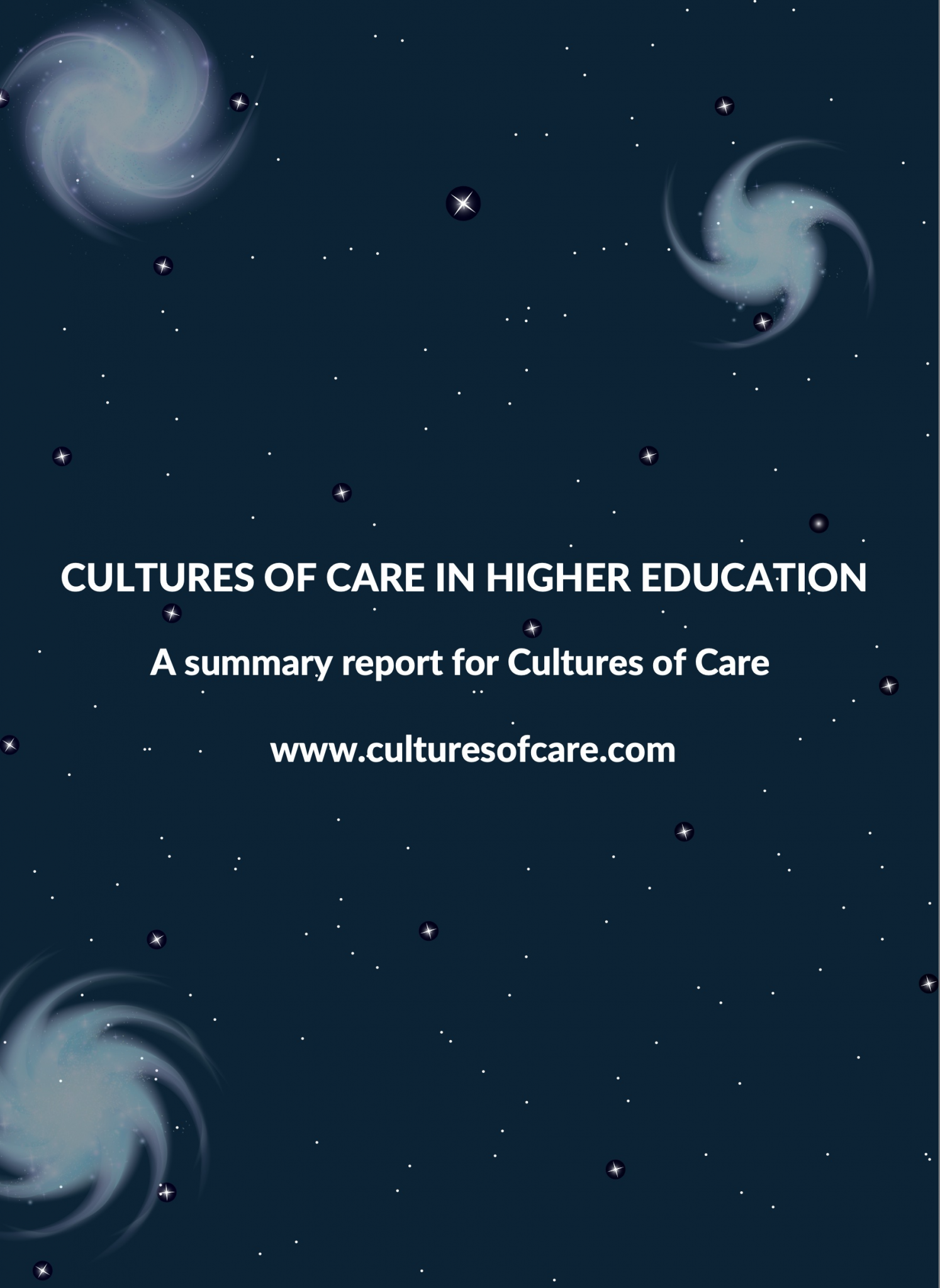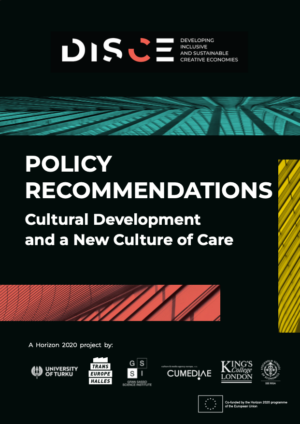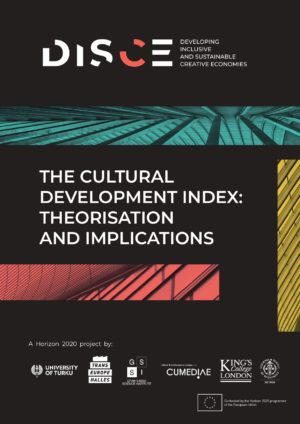--------------------------------
"We
Don't Know"
I am working on a book project of
this title. This is exploring the relationship between knowing and
the unknowable. (I am on research study leave between June 23-June
24.)

Cultures of Care

A central focus for my research is the theme of 'care'. I have written about creativity as a structured practice of care, and about the importance of caring for the cultural freedom of children and young people in cultural education. I also see care as centrally informing research on creative economies.
In December 2020 I was awarded funding to support a new project exploring 'Cultures of Care'. The premise of this project is that as we understand (visibilise and value) contemporary care work – work that is focused on child-care, domestic care, health care, social care, care for the elderly, and palliative care – we also come to visibilise and value the role of care in respect of all productive and ‘good’ work. This is not to relativise care work, nor to appropriate the language of care for neoliberal ends; it is not an exercise in ‘care-washing’. Rather, it is to offer an alternative complementary tactic that responds to the 'crisis of care' – one that seeks to avoid an unintended positioning of care work against other forms of work, and instead recognises, supports and enables cultures of care everywhere, in all walks of life. In so doing, the value of the vital life-sustaining role of care workers – be they working with children, families, patients, elderly or the dying – will be properly recognised. More than this, such work will also come to be visibilised and valued in and across our institutions, organisations, industries and society as a whole.
Cultures of Care asks questions about the nature of care itself. Our starting point is:
Cultures – our systems of value recognition
Care – those practices that maintain, continue and/or repair our world in order to live as well as possible, requiring the ability to see/hear others’ needs and to take responsibility to fulfil these needs
Cultures of care – the cultures we reproduce and transform everyday that enable us to care and be cared for
The
first Cultures of Care network event was held on 11th June, 2021 -
and explored Cultures of Care in Higher Education (see
here).
The
second Cultures of Care network event was held on January 21st,
2022 - and explored Cultures of Care - Tolerating
Uncertainty (see
here)

Between
2019 and 2022 I worked on a
large-scale
research project funded by EU Horizon 2020 - titled Developing
Inclusive and Sustainable Creative Economies (DISCE). This was a three-year study
with partners, including the University of Turku, Finland (as
Principal Investigator), Gran Sasso Science Institute in Italy,
Stockholm School of Economics in Riga, Latvia, the Brussels-based
culture and media agency Cumediae, and the network of cultural
centres across Europe: Trans Europe Halles, based in Sweden. There
were 6 work packages in total, including identification and mapping
of the CCIs across Europe, a focus on earning logics and business
models – and in respect of our team from King’s College London, we
were particularly focusing on the creative workforce, skills and
education, and re-thinking inclusive and sustainable growth. I led
Work Package 5 - on 're-thinking inclusive and sustainable creative
economies'. In particular, this challenges notions of what counts
as the 'creative economy', as 'growth' and as 'cultural
development'. Re-thinking Inclusive & Sustainable Growth
for the Creative Economy: A Literature Review (Wilson et
al., 2019) is available to download on the DISCE.EU
website.
The most recent outputs are D5.3 The Cultural Development Index: Theorisation and Implications, and D5.4 Cultural Development and a New Culture of Care: Policy Recommendations.


The
publications make a decisive and ambitious intervention in
introducing cultural development and a new composite index - the
Cultural Development Index, and what
we term a Needs-Based Approach to Governance and
New Culture of Care
(Available here)
Human Development and Capability
Supporting
my research in DISCE and elsewhere, I've drawn on Amartya Sen's and
Martha Nussbaum's extensive work on capabilities. In 2017 I made
'The case for cultural capability' at the HDCA conference in Cape
Town, South Africa. More recently, I gave a paper at the 2019 HDCA
conference, London (September 9-11, 2019), titled: 'Connecting
Capabilties: A Reason to Value (Aesthetic) Experience'. This is
available to read here.
Towards Cultural Democracy: Promoting Cultural Capabilities
Towards cultural democracy: promoting cultural capabilities for everyone is the final report of King’s fourth Cultural Enquiry. On the basis of a 15-month research project, it presents a timely and distinctive vision of how to build a cultural life for the UK that is valuable for everyone, and made by all.
At the heart of the report is a call for a radical but pragmatic new approach to understanding and enabling cultural opportunity. It is argued that cultural opportunities are comprised of a far broader range of freedoms than access to already existing publicly funded arts – the primary focus of current cultural policy.
Download a One Page Summary Here
Cultural Learning Ecology in Harrow
A New Direction (AND) commissioned this piece of research looking into children and young people’s engagement with arts, culture and creativity in Harrow. This project involved a range of fieldwork designed to help AND & local stakeholders better understand the borough’s cultural learning ecologies.
Network for Art-Based Learning & Education (nABLE)
The network for Art Based Learning & Education responds to the growing interest in art(s) based and creative practice assessment, and what has been termed (elsewhere) as ‘arts based research’ – described as “an effort to extend beyond the limiting constraints of discursive communication in order to express meanings that otherwise would be ineffable” (Barone & Eisner, 2011:1). My own take on this area is to clearly distinguish between 'art' and 'arts' - drawing on my realist theory of art (Wilson, 2019). By drawing attention to ‘learning & education’ as opposed to ‘research’ per se, I also seek to widen the scope of the network’s activities and interests beyond a re-evaluation of the research process itself, embracing the experience of all those studying, teaching and researching in the Higher Education sector.
nABLE hosted The Pedagogy of Ambiguity conference at King's College London in December 2015.
64 Million Artists
I worked with 64 Million Artists (formerly 53 Million Artists) on a number of research projects since 2014. These have included an innovation project '33 Thousand Everyday Artists' in 2015-16, and Wilson et al., (2014) 53 Million Artists White Paper, King's College London